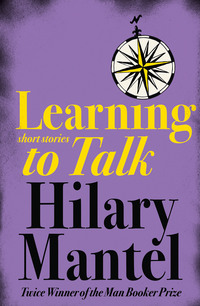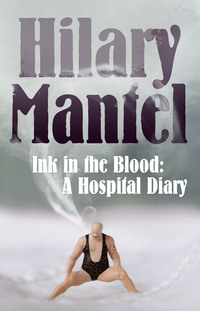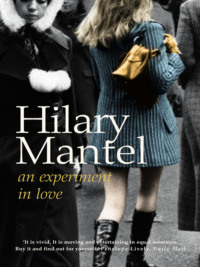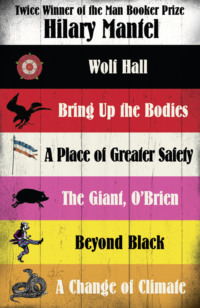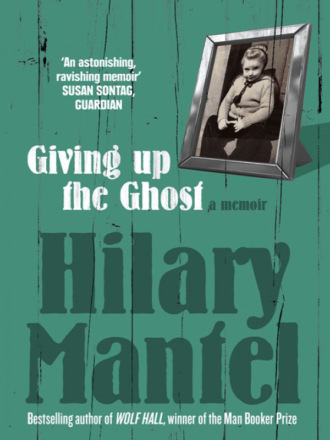
Полная версия
Giving up the Ghost: A memoir
My mother was a tiny, chic woman with a shaggy bob of platinum-coloured hair. She usually wore jeans and a mad-coloured sweatshirt, but everything she wore looked designed and meant; all the time I’d known her, since first I’d been able to see her clearly, she’d had that knack. My stepfather was younger than she was, by a few years, but he had undergone a coronary bypass, and his brown, muscular body seemed wasted. Frail, was not a word I would have associated with him, but I noticed how his favourite shirt, soft and faded, clung to his ribs, and his legs seemed to consist of his trousers with articulated sticks inside. Once a draughtsman, he had taken up watercolours, trying to fix on to paper the troubling, shifting colours of the coast; earlier in life, he would not have been able to tolerate the ambiguities and tricks of the light. Passion had wasted him, and anger; no one had given him a helping hand, he had no money when money mattered, and he was chronically exasperated by the evasions and crookedness of the world. He was honest by temperament; the honest, in this world, give each other a hard time. He was an engineer. He wrote a small, exact, engineer’s hand, and his mind was subdued to a discipline, but inside his chest his heart would knock about, like a wasp in an inverted glass.
I had been six or seven when Jack had first entered my life. In all those years, we had never had a proper conversation. I felt that I had nothing to say that would interest him; I don’t know what he felt. Neither of us could make small talk. For my part, it made me tense, as if there were hidden meanings in it, and for his part…for his part I don’t know. My mother thought we didn’t get on because we were too much alike, but I preferred the obvious explanation, that we didn’t get on because we were completely different.
Now, this situation began to change. Since his heart surgery, Jack had shown a more open and flexible personality than ever in his life. He had become more patient, more equable, less taciturn: and so I, in his presence, had become less guarded, more grown-up, more talkative. I found that I could entertain him with stories of the writers’ committees I sat on in London; he had been a man who sat on committees, before his enforced retirement, and we agreed that whatever they were for ostensibly, all committees behaved alike, and could probably be trusted to transact each other’s business. On that last afternoon, a bright fresh day towards the end of March, I hung back as we crossed the market place, so that my husband and my mother would walk ahead, and I could have a moment to tell him some small thing that only he would like. I thought, I have never done that before: never hung back, never waited for him.
He seemed tired, when we got home after the meal. One of the cats, the striped one, used to lure him to play with her on the stairs. Until recently, he had loathed cats, denounced them like a Witchfinder General; he claimed to shrink at their touch. But this tiny animal, with her own strange phobias, fright shivering behind her marzipan eyes, would invite him with an upraised paw to put out his hand for her to touch; and he would oblige her, held there by her mewing for ten minutes at a time, touching and retreating, pushed away and fetched back.
That last Sunday, when she took up her stance and invited him to begin, he stayed on the sofa, smiling at her and nodding. I thought, perhaps he is sickening for something: flu? But it was death he was sickening for, and it came suddenly, death the plunderer, uncouth and foul-mouthed, kicking his way into their house on a night in April two or three hours before dawn. The doctor came and the ambulance crew, but death had arrived before them, his feet planted on the hearthrug, his filthy fingerprints on the pillowcase. They did their best, but they could have done their worst, for all it availed. When everything was signed and certified, my mother said, and the men had gone away, she washed his face. She sat by his body and because there was no one to talk to she sang in a low voice: ‘What’s this dull town to me?/ Robin’s not near/ He whom I wished to see/Wished for to hear…’
She sang this song to me when I was small: the tune is supersaturated with yearning, with longing for a lost love. About six o’clock she moved to the phone, but all her three children were sleeping soundly, and so she received only polite requests to leave the message that no one can ever leave. On and on we slept. ‘Where’s all the joy and mirth/ Made life a heaven on earth?/ O they’re all fled with thee/ Robin Adare.’ About seven o’clock, at last, one of my brothers picked up the phone.
You come to this place, mid-life. You don’t know how you got here, but suddenly you’re staring fifty in the face. When you turn and look back down the years, you glimpse the ghosts of other lives you might have led. All your houses are haunted by the person you might have been. The wraiths and phantoms creep under your carpets and between the warp and weft of your curtains, they lurk in wardrobes and lie flat under drawer liners. You think of the children you might have had but didn’t. When the midwife says ‘It’s a boy,’ where does the girl go? When you think you’re pregnant, and you’re not, what happens to the child that has already formed in your mind? You keep it filed in a drawer of your consciousness, like a short story that wouldn’t work after the opening lines.
In the February of 2002, my godmother Maggie fell ill, and hospital visits took me back to my native village. After a short illness she died, at the age of almost ninety-five, and I returned again for her funeral. I had been back many times over the years, but on this occasion there was a particular route I had to take: down the winding road between the hedgerows and the stone wall, and up a wide unmade track which, when I was small, people called ‘the carriage drive’. It leads uphill to the old school, now disused, then to the convent, where there are no nuns these days, then to the church. When I was a child this was my daily walk, once in the morning to school and once again to school after dinner—that meal which the south of England calls lunch. Retracing it as an adult, in my funeral black, I felt a sense of oppression, powerful and familiar. Just before the public road joins the carriage drive came a point where I was overwhelmed by fear and dismay. My eyes moved sideways, in dread, towards dank vegetation, tangled bracken: I wanted to say, stop here, let’s go no further. I remembered how when I was a child, I used to think I might bolt, make a run for it, scurry back to the (comparative) safety of home. The point where fear overcame me was the point of no turning back.
Each month, from the age of seven to my leaving at eleven, we walked in crocodile up the hill from the school to the church to go to confession and be forgiven for our sins. I would come out of church feeling, as you would expect, clean and light. This period of grace never lasted beyond the five minutes it took to get inside the school building. From about the age of four I had begun to believe I had done something wrong. Confession didn’t touch some essential sin. There was something inside me that was beyond remedy and beyond redemption. The school’s work was constant stricture, the systematic crushing of any spontaneity. It enforced rules that had never been articulated, and which changed as soon as you thought you had grasped them. I was conscious, from the first day in the first class, of the need to resist what I found there. When I met my fellow children and heard their yodelling cry—‘Good mo-or-orning, Missis Simpson,’ I thought I had come among lunatics; and the teachers, malign and stupid, seemed to me like the lunatics’ keepers. I knew you must not give in to them. You must not answer questions which evidently had no answer, or which were asked by the keepers simply to amuse themselves and pass the time. You must not accept that things were beyond your understanding because they told you they were; you must go on trying to understand them. A state of inner struggle began. It took a huge expenditure of energy to keep your own thoughts intact. But if you did not make this effort you would be wiped out.
Before I went to school there was a time when I was happy, and I want to write down what I remember about that time. The story of my own childhood is a complicated sentence that I am always trying to finish, to finish and put behind me. It resists finishing, and partly this is because words are not enough; my early world was synaesthesic, and I am haunted by the ghosts of my own sense impressions, which re-emerge when I try to write, and shiver between the lines.
We are taught to be chary of early memories. Sometimes psychologists fake photographs in which a picture of their subject, in his or her childhood, appears in an unfamiliar setting, in places or with people whom in real life they have never seen. The subjects are amazed at first but then—in proportion to their anxiety to please—they oblige by producing a ‘memory’ to cover the experience that they have never actually had. I don’t know what this shows, except that some psychologists have persuasive personalities, that some subjects are imaginative, and that we are all told to trust the evidence of our senses, and we do it: we trust the objective fact of the photograph, not our subjective bewilderment. It’s a trick, it isn’t science; it’s about our present, not about our past. Though my early memories are patchy, I think they are not, or not entirely, a confabulation, and I believe this because of their overwhelming sensory power; they come complete, not like the groping, generalised formulations of the subjects fooled by the photograph. As I say ‘I tasted’, I taste, and as I say ‘I heard’, I hear: I am not talking about a Proustian moment, but a Proustian cine-film. Anyone can run these ancient newsreels, with a bit of preparation, a bit of practice; maybe it comes easier to writers than to many people, but I wouldn’t be sure about that. I wouldn’t agree either that it doesn’t matter what you remember, but only what you think you remember. I have an investment in accuracy; I would never say, ‘It doesn’t matter, it’s history now.’ I know, on the other hand, that a small child has a strange sense of time, where a year seems a decade, and everyone over the age of ten seems grown-up and of an equal age; so although I feel sure of what happened, I am less sure of the sequence and the dateline. I know, too, that once a family has acquired a habit of secrecy, memories begin to distort, because its members confabulate to cover the gaps in the facts; you have to make some sort of sense of what’s going on around you, so you cobble together a narrative as best you can. You add to it, and reason about it, and the distortions breed distortions.
Still, I think people can remember: a face, a perfume: one true thing or two. Doctors used to say babies didn’t feel pain; we know they were wrong. We are born with our sensibilities; perhaps we are conceived that way. Part of our difficulty in trusting ourselves is that in talking of memory we are inclined to use geological metaphors. We talk about buried parts of our past and assume the most distant in time are the hardest to reach: that one has to prospect for them with the help of a hypnotist, or psychotherapist. I don’t think memory is like that: rather that it is like St Augustine’s ‘spreading limitless room’. Or a great plain, a steppe, where all the memories are laid side by side, at the same depth, like seeds under the soil.
There is a colour of paint that doesn’t seem to exist any more, that was a characteristic pigment of my childhood. It is a faded, rain-drenched crimson, like stale and drying blood. You saw it on panelled front doors, and on the frames of sash windows, on mill gates and on those high doorways that led to the ginnels between shops and gave access to their yards. You can still see it, on the more soot-stained and dilapidated old buildings, where the sandblaster hasn’t yet been in to turn the black stone to honey: you can detect a trace of it, a scrape. The restorers of great houses use paint scrapes to identify the original colour scheme of old salons, drawing rooms and staircase halls. I use this paint scrape—oxblood, let’s call it—to refurbish the rooms of my childhood: which were otherwise dark green, and cream, and more lately a cloudy yellow, which hung about at shoulder height, like the aftermath of a fire.
Конец ознакомительного фрагмента.
Текст предоставлен ООО «ЛитРес».
Прочитайте эту книгу целиком, купив полную легальную версию на ЛитРес.
Безопасно оплатить книгу можно банковской картой Visa, MasterCard, Maestro, со счета мобильного телефона, с платежного терминала, в салоне МТС или Связной, через PayPal, WebMoney, Яндекс.Деньги, QIWI Кошелек, бонусными картами или другим удобным Вам способом.


